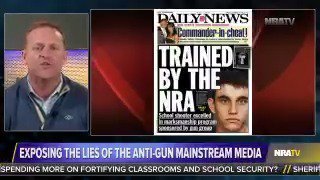Guns before roses: Why mass shootings in ‘Merica don’t necessarily change attitudes on gun control
Like the flag, the gun in the US is also a symbolic, 'hands off' issue in an era of deep political polarisation and rancour.
Gun rights advocates in the US are fond of the above phrase and frequently employ it.
In the wake of every mass shooting in the United States, comes the larger question: why do these agonising moments of national awakening repeatedly fail to mobilise Americans to support gun control policies? Such is the case again after the school shooting in Parkland, Florida which left 17 dead on February 14. Before Florida, there was the Texas church shooting on November 5 and the Las Vegas concert shooting on October 1, with death counts 26 and 58 respectively.
While these and a long list before them may have caused political and social adversaries to unite on the fact that mass shootings must be prevented — the issue does not usually convince gun-rights supporters to rethink their enthusiasm towards guns or even treat them with more reserve.
For gun control backers, there is a direct link between the number of guns in the country, the strength of the National Rifle Association — US’s powerful gun lobby — and its efforts to keep any further gun restrictions from becoming law and the number of mass shootings in the country. But any hopes of ‘surely the carnage is bad enough now that they’ll feel compelled to support sensible gun laws’ have met dust each and every time so far. ‘They’, in fact, may not even conceive of mass shootings to be an argument against guns.
The NRA’s response to the resistance against guns after the Florida event is an instructive one. Not only has it reiterated that weapons are not to blame for the country’s shooting atrocities, but accused journalists and liberals of wanting to take away people’s right to bear arms rather than realising that the fight was between the armed bad guys and the ‘armed good guys’. As Florida shooting survivors protest over US gun laws, President Trump, besides promising “very strong” background checks for gun owners, has been suggesting arming teachers “with military or special training experience” as the solution.
“Guns don’t kill people, people do”
Gun rights advocates in the US are fond of the above phrase and frequently employ it. In a news conference in Japan in the aftermath of Texas church shooting, Trump said: “This isn’t a guns situation. This is a mental health problem at the highest level. It’s a very, very sad event. A very, very sad event, but that’s the way I view it”.
‘Mental health’ often gets blamed in the narrative where guns are defended and vindicated. To be sure, evidence strongly suggests that mass shooters are often mentally ill and socially marginalised and therefore mass shootings shed light on the need for more investment in mental health support networks. However, as scholars Jonathan Metzl and Kenneth MacLeish write in their paper ‘Mental illness, mass shootings and the politics of American firearms,’ the issue is not a simple cause and effect. In fact, gun crimes, mental illnesses, social networks and gun access issues are complexly interrelated and psychiatric prevention efforts need to run deeper than simply barring the mentally ill from legally owning firearms.
Research findings have long supported a strong correlation between the number of guns in an area and its gun homicide rate. Countries and states with more number of guns have more homicides.
The US has a lot of guns and a strong gun culture, that is, Americans use guns much more than their counterparts in other developed countries. In spite of constituting less than 5 per cent of the world’s population, they collectively own 42 per cent of world’s privately owned firearms.
Like the flag, the gun in the US is also a symbolic issue. “To millions of Americans, a gun is a symbol of all sorts of positive, traditional values of independence and freedom,” Richard Feldman, a one-time NRA lobbyist who no longer supports what it stands for, told the BBC. For these people — predominantly older and white — holding on to guns is like the last wicket in their losing match to hold on to the essence of their good, old days. To them a mass shooting is another sign of decay and yet another reason to arm themselves and stand guard.
As David Roberts in the Vox puts it, “You can tell him about Canada and Australia until you’re blue in the face — the lower rate of gun deaths, the hunting exemptions, the seemingly intact freedoms … that no one wants to confiscate his guns”. But to him, he adds, “You’re just another self-righteous liberal on another self-righteous crusade, too blind or stupid to see how governments always use people like you to disarm their citizenry”.
A tough problem to solve
A tough problem to solve
American politics has been increasingly going through a broader and deeper polarisation for a while, with some suggesting that the liberals and the conservatives have not only been talking past each other but almost in different languages which puts argumentation and reasoning beyond the pail. As David Roberts in the Vox puts it, “Guns have now ascended to the level of worldviews and identity, areas largely beyond the reach of persuasion”.
Many believe that it is only the sheer will of the people now that, if it lends support to leaders who advocate gun control, could someday push out the pro-gun lobbyists who currently maintain a stranglehold on conservative American politics.
For all the latest World News, download Indian Express App
© IE Online Media Services Pvt Ltd






































No hay comentarios:
Publicar un comentario